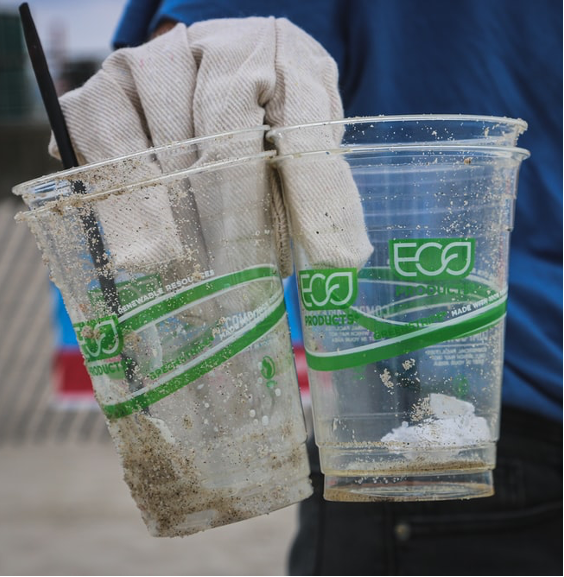Insidious corporate greenwashing permeates the core of consumerism
Sustainability editor Flora highlights recent greenwashing attempts by large brands and corporations, such as ASOS, H&M and Evian

In the face of climate breakdown, ecological collapse, and worldwide inequality, it is understood that transformative socioeconomic change is urgently needed. Corporations and business-as-it-is will need to reform their inputs, outputs, and whole system design entirely. To keep themselves relevant, companies incorporate and co-opt sustainability buzzwords into their public relations, subsequently making the term 'sustainability' ever less meaningful to the general public.
Using environmentally-friendly claims that are misleading is often referred to as the technique of greenwashing. This is a strategy that most of us are exposed to daily, so often that we are not aware of the subtle corporate manipulation.
Often, we see slogans like ‘eco-conscious' or 'ethically made' without questioning what they really mean or asking the company to back up their use. Many terms are so broad, like 'sustainable' or 'green', enabling companies to pick and choose elements from such concepts and then claim that they uphold such values. However, their claims are often unsubstantiated and consequently confuse consumers. They are tapping into the lack of consumer understanding of actual sustainable production.
This marketing strategy is used across various industries, from fashion to bottled water, and often goes unchecked. However, in 2019, Nestle USA faced a class action lawsuit for their claim that their cocoa is 'sustainably sourced' whilst exploiting child and slave labour to produce their cocoa.
Many fast fashion brands trick consumers with misleading sustainability claims. For example, the H&M group reported in 2018 that 57% of all their materials are recycled or sustainably sourced. But it was unclear what these claims really meant. What makes the materials sustainable? How much of these recycled/sustainable materials are in each garment? The company was unable to back up their claims.
H&M also has a 'Conscious Collection' which they consider a showcase of what is possible with environmentally friendly materials – yet there is still no detailing on the quantity of so-called sustainable materials. H&M uses this collection as a cover up (not very well to be honest), like it isn't one of the largest polluters and labour exploiters in the world. It is impossible for them to call themselves anything related to 'sustainable', considering the sheer number of items they produce each year and the consumerist habits this promotes.
Another large fashion brand that has recently jumped at the sustainable fashion trend is ASOS. In September of last year, they brought out a 'Circular Collection' in which the garments only needed to pass through two of their eight circular principles to be regarded as 'circular'. This lack of rigorousness goes against circularity foundations: circular principles work in synergy; they do not work alone. Furthermore, the collection only made up a tiny proportion of the tens of thousands of products for sale on the ASOS website from over 850 brands.
Sustainability is not just implicated in the way of production, but also in the patterns of consumer behaviour
It is noticeable that brands are now trying to show that they are not just sustainable but also ethical and circular, as seen in Virgil Abloh and Evian's recent collaboration. On 6th January of this year, an article was published in Forbes presenting the collaboration's new design of an 'ethical' water bottle. The water bottle is 100% recycled and is 're-created from the recyclable polyethene terephthalate'. The article glorified the use of plastic and presented the project as a circular initiative, but it must be noted that the recycling of plastics cannot be done endlessly. Evian may be funding these 'sustainable' side projects, but they continue to produce millions of plastic bottles every year and contribute to environmental degradation globally. Plus, if they get us to think that bottles are being recycled, we tend to forget about the danger of the ever-growing bottled water industry.
The use of greenwashing language is dangerous and misleads us all. Sustainability is not just implicated in the way of production, but also in the patterns of consumer behaviour driving current high consumption rates of resources, implicated by our economic role as consumers to provide endless growth and 'prosperity' for the few. When brands draw our attention to certain elements of production that make an item more environmentally friendly, like using less water or emitting fewer greenhouse gases, they are trying to highlight how sustainable they are but forgetting that sustainability is not quantifiable with a few environmental measures - what is really important is the design of the whole system.
We need to have a more critical thought process when we are presented with 'green' terminology and marketing in general. There also needs to be a consensus of what some words really mean, and this conversation needs to be open and accessible. For further knowledge of what is true circularity, we recommend using the content found on The Ellen MacArthur Foundation's website.
If you would like to write for Sustainability Felix, please send us an email: sustainability.felix@imperial.ac.uk.





